- Issue #17
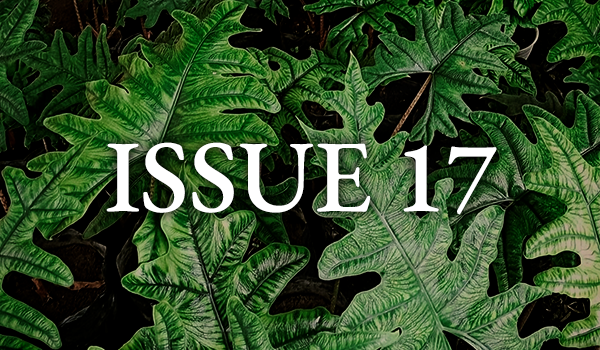
- Tara Labovich :: “Liar”
On the moonwalk of a first conversation,
we float between stars, pointing together,
using what we’ve got of rare oxygen.When speaking with a stranger, sometimes
I wake up in the middle of speaking
and catch myself in the crater of a lie.
I am afraid no one will understand.
Really understand.Just this week I told a woman on a first date
I was terrible at keeping houseplants alive.
She liked me. There was no need to lie.
It’s true, last autumn many friends left my life.
and with them, twenty of my houseplants
gave themselves up to fungus.But now, my life is so full of greenery
and good living. I wonder why I put the lie
on the table when she moved closer
on that dark, moon-lit bench.
I wonder what I’ve got left to hide,
when all the plants are doing so well.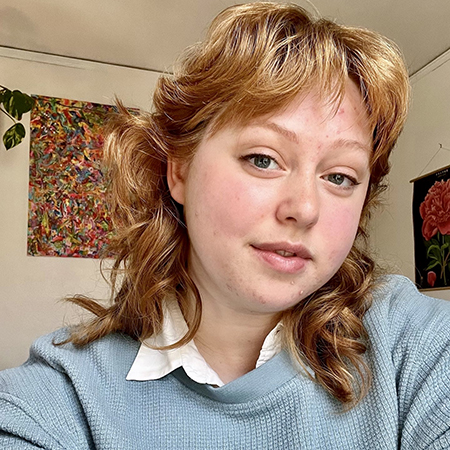
Tara Labovich (they/them) is a writer and lecturer of English in Iowa. Their teaching and writing has won awards such as the Pearl Hogrefe Grant, Adelaide Bender Reville Prize, and is nominated several times for Best of the Net and the Monarch Queer Literary Awards. Their writing can be read in journals such as Brevity, Crannog, and Salt Hill.
- Nikki Wallschlaeger :: “Lilac Sonnet”
climate change
causes stress
so the lilacs
bloom twice
no confusion
only genius
Venus genus
Syringa Venus
purple October
your red hair
lilac freedom
chrysanthemumwe fool them all
looking for doom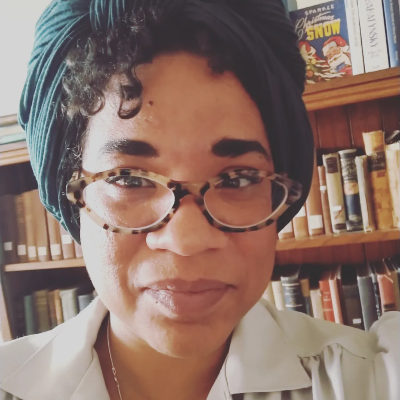
Nikki Wallschlaeger’s work has been featured in The Nation, Brick, American Poetry Review, Witness, Kenyon Review, POETRY, and others. She is the author of the full-length collections Houses (Horseless Press 2015) and Crawlspace (Bloof 2017) as well as the graphic book I Hate Telling You How I Really Feel (2019) from Bloof Books. She is also the author of an artist book called Operation USA through the Baltimore based book arts group Container, a project acquired by Woodland Pattern Book Center in Milwaukee. Her third collection, Waterbaby, is out from Copper Canyon Press. She was a Visiting Associate Professor of Poetry at the Iowa Writer’s Workshop from Spring 2021/ to Spring 2022.
- Aaron El Sabrout :: “Late in the Fall”
growing fat on stolen
community garden veggies
while the bombs drop on
our people halfway across
the world
eating grilled cheese with
the good heirloom stripey
tomatoes my white neighbor
transplanted to their plot &
forgot about
if i stood on the street while
the world burned & screamed,
if a cop shoved me for it, did
i do anything?
i grew my plot for the wasps &
the bees, calendula straggling over
the ground, autumn covered in
orange—like the marshall’s vest
at the march.
they stood a foot shorter than
the pig, their chest puffed up to
face him, they thanked him for
the threat, their cigarette
puffed
gray smoke in his snout—
like the fires from the bombs,
still falling, like the fires lit by
settlers
defending themselves
in advance, defending themselves
with barricades of dead children’s
bodies—
i assume—i just sit
in the garden where the
ladybugs devour aphids &
tomatoes go soft, rot & fall
to the ground,
while in gaza they are
running out of food, where
down the street our
neighbors live in tents
& starve.
we raised money & shared posts
& then? turned it out, tried to get
it in as best we could, sucking
& fucking in the end
of the world.
like the wasps, buzzing over
every last patio beer & sour
garbage can, gathering the
last nutrients before
the frost.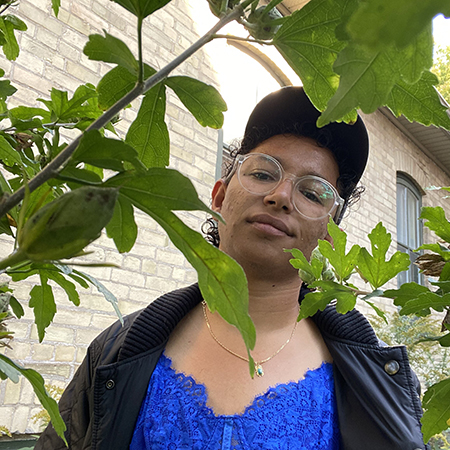
Aaron El Sabrout is a transgender alien currently living on unceded Haldimand Tract Territory (Haudenosaunee, Michi Saagig Anishinaabe, Attawondaron). He is originally from Cairo, Egypt. He makes comics, art, poetry, and video games, all of which are weird and trans and to do with plants somehow. His work has been published in We Want it All: A Radical Anthology of Trans Poetics, featured in the Seattle Erotic Art Festival, and he is a recurring contributor to T! zine. His games and zines can be found at https://toreachpoise.itch.io. As you read this he is likely out dreaming of mushrooms or planting seeds for liberation.
- Christopher Phelps :: “I Really Wish You’d Stop Dying” and “Why Am I Pulling So Many Dead Leaves Off This Hanging Inchplant”
I Really Wish You’d Stop Dying
I said aloud to a plant in my own voice, trying
for a moment to pause. The other voice
inside, one who knows better than—
the plant hung so close to my head
I could, without erring or blushing,
say we sleep together—
denial? I’m not denying anything,
not even the stim of a selfish note
pressing into the stems of this
purple and green affair
bypassing saturation. Meaning
if I were to paint a flowering abyss
you could fall into like a video game
leap, by mistake—a mistake that
could be happy if it’s years ago
and the game rewarded you for the error
of being less than perfectly able to stay
alive at all times, there being more
room for you below—and the mistake
really could have been an escape,
as well, some parts of the mind make,
slipping from the grip of the demand
to continue, I would paint it
in green flowers and purple leaves
with so many shades of each
receding into shadows
and emerging into patches, all I could do
would be to fall, farther and farther
into and out of love—not back
and forth so much as farther down—
the way a fractal will unfold
more edges of itself, more earthly
and unseemly blossoming.
I hope for this: I mix for it
a spoon of powdered sea into a pitcher
with a cold and narrow neck
and spout the blurt of love straight
into the air escape, the earth escape,
the water escape, with the fire
waiting with its simmering hunger
and unquenchable desire to take
the rest of the dying home.Why Am I Pulling So Many Dead Leaves Off This Hanging Inchplant
- They’re fun to hunt and find, found by sound in the interior when the rubbing is kindling-dry.
- Doing so may help the health of what remains.
- I have time on my hands—in my hands, since elsewhere it’s rarely even reachable.
- Both of my parents are alive, for the lengthening moment a day at a time, more precariously than they have ever been. My mom struggling three years now with catatonia—was the diagnosis, not that anyone understands, least of all her, how that could be right. My dad two decades down the road of three cancers, celf-destructions collected like cards from an unlucky hand.
- That death is part of life doesn’t mean you have to leave the skeletons in your room.
- A doctor, shrugging, this many years into the fold, he might just live.
- just—because
- I like the feel of them pressed together, a tight and tighter bind of but now that we’re here…
- The sparser vine has a look to it, past gaunt, still growing in places, still flowering in debris of miniature purple trefoils, one after the other like maybe one of these tries will take.
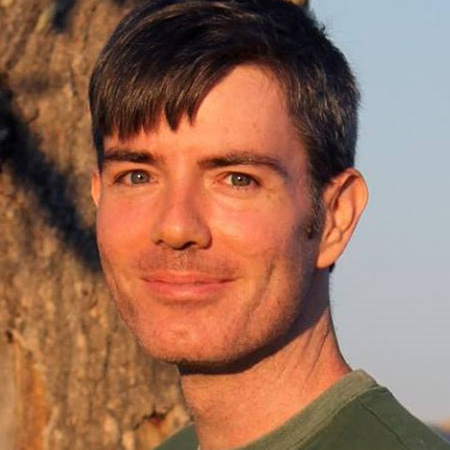
Christopher Phelps lives in Santa Fe, New Mexico, where he teaches himself and others math and related mysteries. He is queer and neuroqueer, autistic and aphantasiac, twainbows that underwrite his attempts at creative solvency and steadfascination. His poems have appeared in journals including Beloit Poetry Journal, The Kenyon Review, The Nation, Poetry, and RHINO. A chapbook, Tremblem, exists as a secret item. Find him at www.christopher-phelps.com.
- wallamide :: “meditation looking through the fence”
I.
we look out over the grasses and grains as the wind
shares life with them their spirit different than in
rain. gusts kick up over the rolling hills breathing
life into the trees again. what was it like before
w.a.s.p.’s reign? before colonization, did these
pecans fall the same?did the five nations i’m aware of that hid away
share the pecan’s name? how long can i trace
these chives’ or wild onions’ or poisonous oaks’
roots in this place?can i trust the records kept at the botanical research institute
or afford the material cost of learning from the five
nations? destroy the lands just to pay respects but i’m not
those ancestors entrusted to burn prairies; relatives keepers
protectors of these lands they’re still mourning.we were forced settler by the half that holds the freedom of memory; brown
skinned suffused into olive by the history of the euromexi settler gentry left in
our consciousness until we take up the task of unforgetting;how many genocides were they allowed to forget to monocrop to their
pastoralist fantastical heart’s content; what did the mexi parents run from
with the euro gentry, to immigrate before borders and be held in place by the
legal settler identity? what do our stolen ancestors call the spirit in the wind
anyway?II.
we look out onto the rolling hills
a nearby settler’s chickens roam
allowed to be free range in ways most of these native grasses called weeds
will ever know. the modern dinosaurs fertilize, walking over accumulated
seeds and pollens—the gusts help kick up bugs for them to cycle but, like
cardinals, they eat the cat food left for the mammals.where do the nutrients in cat food come from? what happens to the nutrients
as they get processed by each animal? should i have to kill thousands of
animals removed from the shrubs they love just to study that? bourgeois
colonial science tells us so.where’s the balance on the hills?
only the decorative plants are managed
and from settler consciousness comes the need to kill native
life on the land to call it managed. a squirrel maybe plants
another tree, but we can’t see the seed.so we have to wait and see what emerges from the squirrel’s
potential incidental agricultural experiment.gusts kick up over the rolling hills again as
life moves around us all
matter alive and connected
like us.III.
we breathe the air in and wonder where her particles have
been. from what occupied lands has this scent drifted in? the
sound of jets pick up again weapons manufacturers and army
personnel in need of “tests”. what occupied lands did that burnt
jet fuel come from?what murdered dead stolen lands have i been forced
to become?
strained relations between the stolen and ancestral parts of
us at war with the parts comprised of the settler nation or at
least their products.the jet fuel moves the jet the air moves what it’s
spent the plants too become imbued with stolen
land weaponized and used for training.what plants grow on the lands that are occupied
to make the jet’s components? what birds roam
over the lands the jets will go? what occupied
peoples have we been witness to the training
for their genocide?more rumbling beyond the treeline and gusts bring
back the dead leaves to life. the gusts keep mounting,
building, colliding clouds condensing and blocking
energetic light.IV.
we focus on our breath again, and start to wonder from what cycle of
life has this air been stolen by the settler bourgeoisie for us to take on
their legacy of stolen land? they build us of what no one consents to,
the air no longer given to us by native plants our people connect through
but tainted by the spirit killing breath of capitalism,
the social system that colonizes you,from the inside out replacing your every molecule
with stolen land as you’re bombarded by how this
society is material.settler minds constrain time and remove what is real just to
mythologize the political lines of flower moon killers. just
as jets occupy to build and fuel more jets.the vultures make their round through the area
unphased by the colonialism they witness. the web
of life laid bare to the eyes of the hunter of the dead.
how we have been colonized is not yet fully realized
through all consciousnesses present.vultures move through, other predators too
and cardinals and jays and titmice dart past.
the rumble of international fascist violence not fully
realized in the minds of all consciousness present.the hills are alive bees, their friendly wasps, and
flies remind us of the other connections
between life.V.
we should know the native names of everything but
intergenerational scars still act as a cost that prohibits.
we do not know what grasses are sacred for sacrament and sacred for
sustenance just so settler minds can constrain our time to make us reliant. then
we hear the bugs pick up again the leaves, grasses, seed pods, and branches
jump to life again. the distance grows loud with cars (stolen land)
jets (stolen land) construction (on and with
stolen land); the air fills with debris and other
pollution drifting off to colonize the air of
other nations.why must we uphold these contradictions
just so settlers minds don’t feel friction?
just so these lands, plants, and all native
life aren’t as free as a settler’s chicken?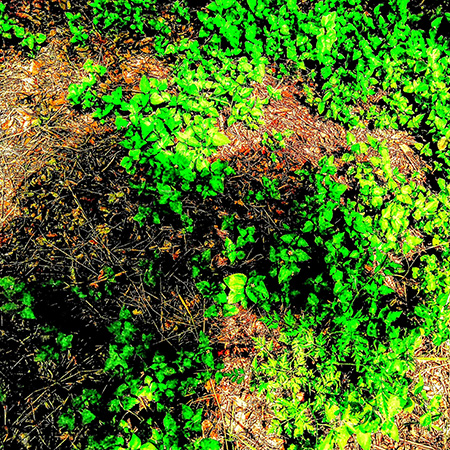
a half denationalized brown turtle islander/half scottam settler lady faggot with a body feeling the weight of bourgeois medicalization, wallamide is an anti-political propagandist comprised of social clumps of microbes and human cells (currently made of accumulated stolen land) on turtle island. pulling from -and revolutionizing -a background in bourgeois material, social, and historical sciences, her work centers around land back and the death of dictatorships of ruling classes and their violent societies. as part of her personal struggle against bourgeois science, she seeks to engage with proletarian science from the margins. ALOCASIA is her first lit journal publication outside of her blog/music sharing page on mirlo.
- Adrian Dallas Frandle :: “Dracaena trifasciata,” “Monstera deliciosa,” and “Spathiphyllum”
Dracaena trifasciata
jake ass up
on the trash
heap in the
garage.
jake a gay
snake plant
who died
of rot
& i fear
too often
that i am
too much
like jake,
rottenMonstera deliciosa
the future rips
itself from stalks
of selfsame
stuff, plant
matter torn
hollow to form
another
self out of
its insides—
the tear
itself is
time—new
leaves unfurl
only at the end
of a stem.
Fuck.
Guess I’ll wait, then.Spathiphyllum
he called it bitchy—
the peacelily who pouts
when thirsty—i said
a bitch
like me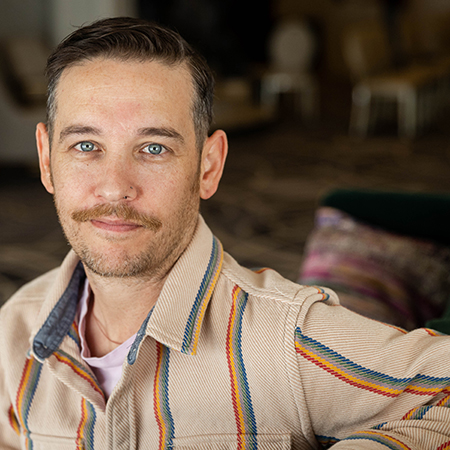
Adrian Dallas Frandle (he/they) is a poet, editor, educator, & queer fish. Book of Extraction: Poems with Teeth was published in 2023 by Kith Books. You will find recent work featured in Poet Lore, Honey Literary, and hex literary. Adrian also pens a monthly poetry column for the local paper The Stratford Crier. Read more at adriandallas.com.
- Zoe Adrien Lapa :: “Consummation”
When I was young I said I didn’t want to be a boy or a girl, I wanted to be a plant. I had never been a go-getter but the want grew to be bigger than my body. I held it inside of me as it festered, as it grew up the trellis of my ribs. So I held jungle geraniums under my tongue and spoke spells through the mouthful. I pricked my index finger with every spike on a small cactus, one after the other. I licked the strange milky-white sap dripping off of broken leaves on my grandmother’s ficus. I knelt on a bed of perennial peanut grass and twisted their yellow flowers until the stems weakened, gave up, fluttered downward. Nothing came of these. For a more traditional approach I ate apple cores, gnawed on mango pits, stole vegetable scraps from under my mother’s elbows in the kitchen so I could spoon the seeds of sweet bell peppers directly into my mouth. Nothing came of these, either. I decided if I couldn’t be a plant I could maybe be a terrarium. So I started eating turtle vines. Scraped moss off of walls with my teeth. Swallowed a small pink fittonia cutting, tiny white roots and all. I started taking spoonfuls of lush brown dirt from the garden like medicine, once in the morning and another in the evening. I took perfect white pebbles and shiny little rocks. I told my mom I needed activated charcoal for school and took that, too. And drank a lot of pondwater, seasoned with duckweed. I convinced myself I was growing translucent, my brown skin turning gray and clearing up little by little. I convinced myself I was becoming a self-sustaining ecosystem, wholeness layered like onion scales or nesting dolls or a ripe banana heart. I convinced myself it was working. After a while it was clear that I was lying, that still nothing had come. I wasn’t giving up, though. If I couldn’t become a terrarium I could maybe be mulch. I sipped the brown juice gathered in the bottom of buckets of compost, shredded and ate the dead leaves my grandfather swept up from the garden, took wood chips and bark and sawdust and cardboard, took rice hulls and newspaper and powdered seashells, took straw and hay and grass clippings and gravel. And then I laid my body down on some good, wet soil and waited. I thought—perennial peanuts. Jungle geraniums. Touch-me-nots, asters, rose mallows, pigeonwings, arrowheads, bird’s-nests. Citronella, silvergrass, carabao grass, goosegrass, dropseed. In wilder dreams—rafflesia. Nepenthes, sundews, bladderworts. In miracles—a mangrove swamp. I believe in noble causes. In self-actualization. In active pursuit. I am no longer so young. I am convinced I am becoming, becoming. I am going to die this way, I know, but it won’t be forever. Everything inside of me must one day come out.
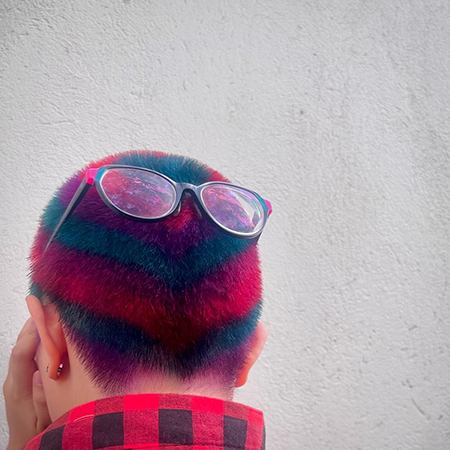
Zoe Adrien Lapa is a microblogger first and an author second. You can find their work on Tumblr via @blubbed or in places like Haunted Portal, Palette Global, Exist Otherwise, and elsewhere.
- Erin Mizrahi :: “I’m Talking to My Plants Again”
Time is silky. It is iridescent & mossy green.
It curls under your tongue. We are all hiding
where we can.
I need to plant more seeds. That’s not a metaphor.
I need to tell my father I’m moving to Honolulu.
There’s always something in the way.I mean the world is on fire. Still not a metaphor.
I don’t think I’ve ever used a metaphor correctly.I’m trying to awaken something. The way
it feels in your mouth to say Cy Twombly.What am I shaking loose? Have you noticed
the way empty pistachio shells look like tiny
raptor mouths?I am so full of questions. What can you do with leftover
couscous? Is the ocean ok? Could we shift toward
tender monuments? To things that coo, or any flowering?I drove across the country & back to save my plants
in New York. I was stopped entering California,
told my plants have to go. There was something wrong
with the dirt, it could spread if not contained.There is no end. To what a living world. Will demand of you.¹
In the middle of the desert in one-hundred &
twenty degrees, I am screaming.Or I think I am screaming. I think of Hannah,
of the first prayer as eruption.They want to take my plants away.
How can I tell these officers I can’t lose them
that I’ve already lost so much.I’m talking about miscarriage.
Dear reader,
I was trying to be subtle.
Can you imagine?I am standing on a border in a heatwave
in a desert surrounded by officers,
desperately clinging to my houseplants
& screaming there is nothing wrong
with their dirt,
is this not the metaphor?I tried to bury loss inside language
but language too must breathe.
If wild.
If flower.I was worried for your comfort.
Worried I might lose you too,
at this hour,
in this poem.They tell me if I really loved my plants I would’ve gotten
them the right papers. If I really loved them, I would’ve
named them. But I’ve learned not to name what I’m not sure
will survive.I’m struck by how many men hate agapanthus.
Without its blossom it can be mistaken for a weed.
It must be translated to be seen.We’ve reached a new vulnerability.
I mean it’s Tuesday or really any day.I hold my plants close. Cup my hands
around my tiny sprouts whispering,Do not rush, not into this world
It takes 9 months to grow a single head of garlic.
As I mince each clove I think
I am a brute destroying a miracle.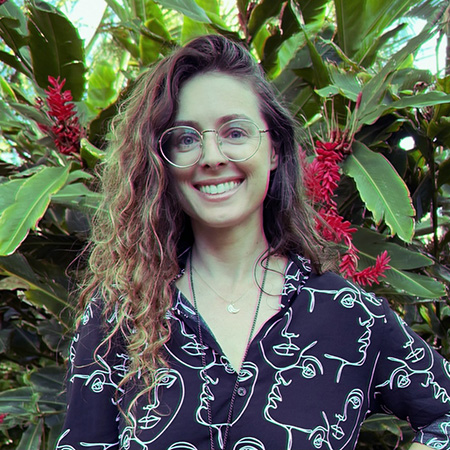
Screenshot Erin Mizrahi is a writer, teacher, collaborator and co-founder of Cobra Milk. Erin is author of the forthcoming chapbooks To What End: (Ethel Press 2026) and I’m Doing My Best To Make Everything Holy (Faint Line Press 2026), as well as co-author of the micro-chapbook, If We Break, Where We Break, How We Break (Ghost City Press 2023). Erin holds a Ph.D. in Comparative Literature and Media from USC. Their writing has appeared in Bending Genres, Hunger Mountain, Oroboro, Rogue Agent and elsewhere.
- Shui-yin Sharon Yam :: “The Gardener”
Mother, I want to write
to you. I want to write
about you. Because I cannot
write for you.
You named me 萃 | 言
because you wanted a daughter
who could wield words that serpentine
and cut.
Because my tongue
would only grow with a pious devotion,
you made the library your church.
The fifteen unyielding
books each week jabbed at your thighs with hard sharp
corners, lacerating your shoulders.
The marks on your skin
were an offering.
Mother, did you know
the 萃 in 拔萃 means
an exuberant riotous
thicket of weed?
To find and grow
something exceptional,
you must first
remove the weed.
Mother, is that why
you have tried so hard
to weed my tongue?
But all the binding and burning
cannot extinguish
the wild tongue that wants
to grow like chives.
Mother, when you see my name now
do you see a wretched wilderness
that stuns you with its thorns
or do you see
a sea of bindweed
blooming white and pink?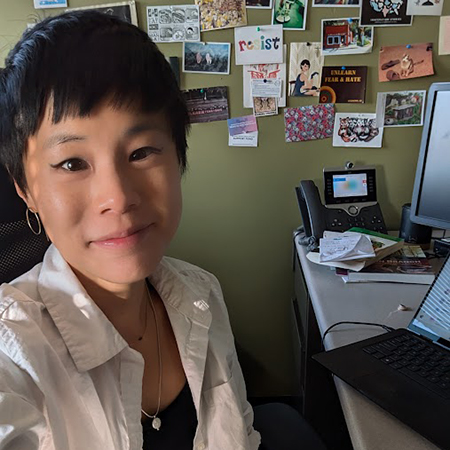
Shui-yin Sharon Yam is a diasporic Hongkonger living in Lexington, Kentucky, where she works as a rhetoric professor. She is the author of two books—most recently, Doing Gender Justice: Queering Reproduction, Kin, and Care (co-authored with Natalie Fixmer-Oraiz).
- oleg olizev :: “green voices of the page”
etude
lungs of time, they’ve turned into paper beneath fingers that once tore at their own flesh. still damp with seed, they drag their stickiness across the surface. but the pages breathe. they remember themselves as plants, even soaked in human pollen. now they live where the body collapses, and still they refuse grammar.
on them, irises live in their own century of weather, bright and motionless. the house burns down, the petals remain. they hum in ultraviolet; you can almost hear them, a frequency below mourning. fuchsia skin stretched over the pulse of endurance. the paper aches for a former love.
here roots become nerves, sap becomes desire, chlorophyll turns into blood. pages from a world where growth is erotic. ah-ah-ah, the stem trembles, reaching toward consciousness. the root, a body thirsting for light. a tree planted in flesh, a scar sending out branches. pain performs photosynthesis, memory green and alive. nothing ever dies completely; it becomes a root. how can pages survive such transformation.
blackberries explode with time, the blood of summer dark and fermenting. sweetness already rots. we eat mortality. wine spilled by a boy drunk on pollen. a bee crashes into the bud.
pause. breath. a shift of air. a warm rain passes over the garden. the paper hovers, ready to receive another layer of green.
a garden on radioactive stones, moss glowing the color of hope and decay, two shades of the same green. survival as performance – that is creative optimism. learn the alphabet of photosynthesis against extinction. even here we grow, dreaming of meiosis. “we are witnesses,” think the sheets of paper, “we are archives.” the magnolia dense as wine. the oak remembers who once hung from its branch. no sermon, only humidity.
rain. olive. grass. letters choke like soil after a gunshot. pages soaked with a student’s semen say nothing. and the student, illuminated after orgasm, listens to the tulips scream, red wounds in a white room. the flowers accuse him of wanting peace. their color enters his body; their petals are the lips of insistence.
bury your face, obedient boy, in plastic ivy, neon grass, in flowers that never wilt. outside, the city hums like a dead greenhouse, growth replaced by simulation, antique statues frozen in the pose of eternal photosynthesis.
still, even now, something pushes through the asphalt of the sentence. woolf’s fuchsias, lawrence’s sap, morrison’s scar, dickinson’s intoxication, jarman’s moss, faulkner’s oak, plath’s tulips, welsh’s weeds – they all rise through the page, promising not to die for your metaphor. language too grows by photosynthesis. syntax turns silence into breath. every word a leaf trembling toward light. listen: the green voice beneath the human one. it whispers through every book, every lung, every wound. it says nothing ends, everything continues, continues, continues.

oleg olizev is a manhattan-based writer and artist whose work explores the intersections of body, language, and transformation. his writing has appeared in panorama, beyond queer words, bull: men’s fiction, and stone of madness press, among others.